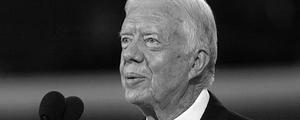PRINCETON, NJ -- Neither George W. Bush's deliberate silence about the Obama administration nor Dick Cheney's ready criticism of it appear to have altered U.S. public perceptions about either man. The former president and former vice president are each viewed unfavorably by 63% of Americans, very similar to where they stood with the public in their final White House years.
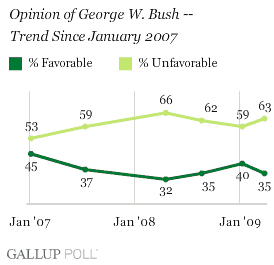
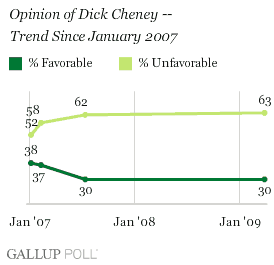
The last reading on Bush's favorability that Gallup recorded during his presidency came in a Jan. 9-11, 2009, survey. At that time, 40% of Americans viewed him favorably and 59% unfavorably. However, this represented an unusual spurt in positive feelings toward Bush, possibly due to changes in media coverage of the embattled president as his term ended, or because of Americans' generally buoyant mood leading up to Inauguration Day. (Barack Obama's favorable reading in the same survey was also higher than in previous and subsequent polling.)
The 35% of Americans viewing Bush favorably today is close to his all-time low of 32% in April 2008, and matches a favorable rating from August of that year. Bush's ratings have consistently been in negative territory since July 2005, a sharp contrast to his generally positive image throughout his first term.
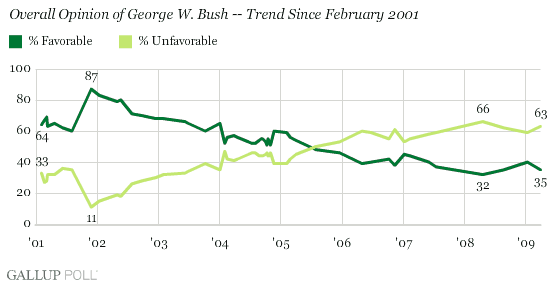
Partisan Differences Hold Firm
In delivering his first post-White House speech last month in Canada, Bush ruled out second-guessing the sitting president. In reference to Barack Obama, Bush was quoted by the Associated Press as stating, "There are plenty of critics in the arena. He deserves my silence." Bush went further, saying "I think it is essential that he be helped in office."
Despite Bush's seemingly "post-partisan" stance toward the new president, Democrats' reactions to Bush remain overwhelmingly negative. Only 10% have a favorable view of him and 89% an unfavorable view, little different from their views of him in August of last year -- at the height of the rancorous election season.
Bush continues to be viewed favorably by about 3 in 10 independents and roughly 3 in 4 Republicans.
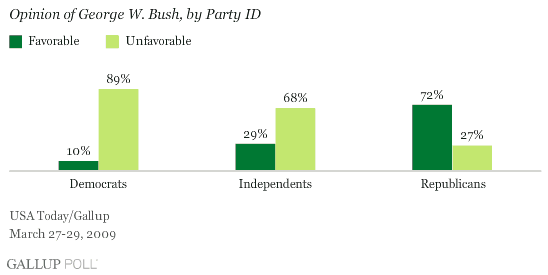
Cheney's Ratings
The 30% of Americans viewing Dick Cheney favorably today matches Gallup's previous favorable reading on him, obtained in July 2007, which was his all-time low. Cheney's image was somewhat better in the first half of 2007, but the last time he was viewed more favorably than unfavorably was in June 2005.
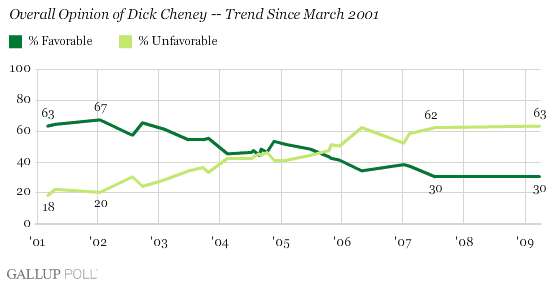
In the same week that Bush demurred when provided with an opening to critique Obama, Cheney readily took issue with the new administration on several counts during a television interview, responding "I do" when the host asked him whether he believes Obama's policies make the country "less safe."
Democrats today feel nearly as negative about Cheney as they do about Bush: only 12% view him favorably while 82% view him unfavorably. This is statistically unchanged from July 2007 -- however, with favorable ratings near the 10% level, Democratic opinion of Cheney could not go much lower.
Most independents also view Cheney negatively, while a majority of Republicans view him favorably.
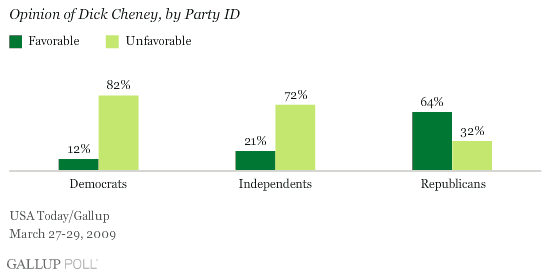
Bottom Line
Bush and Cheney have only begun to emerge publicly after departing Washington, D.C., in January. Thus far, Bush has promised to stay out of the political fray while Cheney has stepped squarely back into it. If this distinction holds over time, it could conceivably contribute to a divergence in how Americans perceive the two -- with Bush's personal image among Democrats softening while views toward Cheney become even more polarized. Of course, other factors will come into play as Bush and Cheney establish their post-presidential roles in public affairs, and as the Bush presidency continues to be assessed. At this early juncture, however, public attitudes about the two former leaders have not yet changed.
Survey Methods
Results are based on telephone interviews with 1,007 national adults, aged 18 and older, conducted March 27-29, 2009. For results based on the total sample of national adults, one can say with 95% confidence that the maximum margin of sampling error is ±3 percentage points.
Interviews are conducted with respondents on land-line telephones (for respondents with a land-line telephone) and cellular phones (for respondents who are cell-phone only).
In addition to sampling error, question wording and practical difficulties in conducting surveys can introduce error or bias into the findings of public opinion polls.
